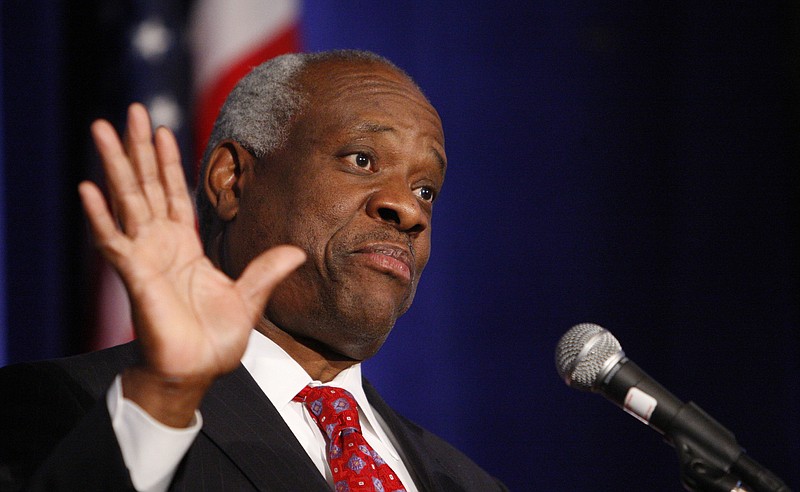Sheep being shorn
Not long ago, students at Georgia's Savannah College of Art and Design drew up a petition to have U.S. Supreme Court Justice Clarence Thomas's name removed from a campus building.
Apparently, the petition dealt with unproven sexual allegations leveled at the Savannah native during his 1991 Senate confirmation hearing. A former co-worker, Anita Hill, had alleged various untoward things but, instead of reporting him, kept following him from job to job. Nothing was proven and the jurist was confirmed, but the left - upset because the conservative appointee replaced a liberal appointee - never got over it.
Recently, Campus Reform went to the school to see why they thought Thomas should be ousted.
"I honestly think he should be removed," one man said. Asked why, the man said, "I don't know. Um. Hmm. Do you mind if I get back to you?"
A woman said, "I agree it should get removed." When asked why, another woman who wanted his name removed said, "I don't know. I haven't done much research on this."
Another student compared Thomas to Hitler, both being "historical figures." So what was his argument for removing Thomas's name? "Nothing in particular," he said.
"Well," said one woman, "I don't know what he did."
"I mean, I don't really know anything about him," said another woman, who said she'd sign the petition.
All negative, all the time
The numbers are in for 2018, and few will be shocked that the evening newscasts on ABC, CBS and NBC matched their 90 percent negative coverage of President Trump in 2017, according to the Media Research Center. To look on the bright side, at least the supposedly nonpartisan newscasts didn't get more partisan.
In spite of the constant drumbeat of negative coverage, the president's approval rating actually increased from 40 percent on Jan. 1 to 42.7 percent on Dec. 31, according to RealClearPolitics.
Trump was the networks' biggest story of 2018, as he was in 2017, but coverage for the year fell from 99 hours to 87 hours, which still made up 28 percent of the networks' broadcasts.
The Russian collusion investigation remained the biggest Trump-related story for the second straight year, its 858 minutes of coverage 98 percent negative. That subject was followed by his immigration/border policies (643 minutes of coverage, 94 percent negative) and the Brett Kavanaugh Supreme Court battle (435 minutes, 84 percent negative).
Hairy situation
Organizers of a comedy show in Montreal recently banned a white comedian from participating because they said his dreadlocks were discriminatory.
"We will not tolerate any discrimination or harassment within our spaces," the organizers said of Zach Poitras, and they added that cultural appropriation, in their view, was when "someone from a dominant culture appropriates symbols, clothing or hairstyles that come from historically dominated cultures."
Not so long ago, it was felt imitation was the sincerest form of flattery.
Officials with the Coop Les Récoltes bar, where the two-night comedy event was to take place, said Poitras might not be racist himself but that his hairstyle acts as a "vehicle" for racism.
Unfortunately, the Canadian incident is not the first instance of such sickness. Actor Zac Efron was accused of cultural appropriation after he released a photo of himself with dreadlocks last July, and a student at San Francisco State University was captured on video assaulting another student with dreadlocks after an argument on the subject. Left-wing activists even attempted to lobby the United Nations in 2017 to make cultural appropriation illegal.
Ever wanted to learn about your privilege?
Augustana College's Winter Symposium Day gave students a chance to do so last week by playing Monopoly. The exercise, called "Understanding the Effects of and Response to Privilege Through Intergroup Monopoly," suggested students would play the game, then discuss social justice.
"Ever heard the phrase 'don't judge someone until you've walked a mile in their shoes'? Why not learn that same lesson while playing a game according to someone else's rules. Come play a game of Monopoly and get a lesson in social justice and perspective-taking at the same time," the event description reads. "Game play will be followed by a discussion of your experience moderated by a group of faculty members representing psychological and sociological perspectives."
Normally in Monopoly, how you do is determined by the roll of a pair of dice. If you play the game by someone else's rules, things would naturally be skewed. But that can be the case for anything in life where someone else makes up the rules.
If Monopoly wasn't enough, students also could learn about social justice in sports, identifying microaggressions and business social justice.
In other words, Winter Symposium Day was a day to find out how to be further aggrieved. What fun.
